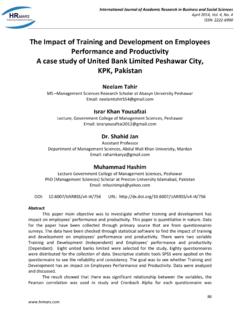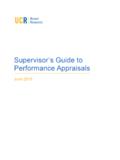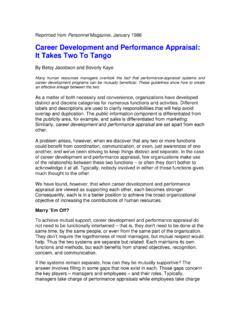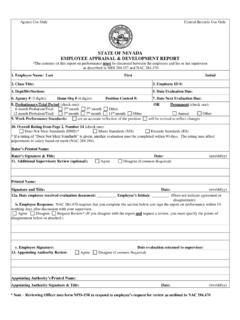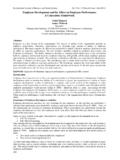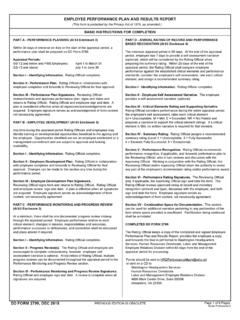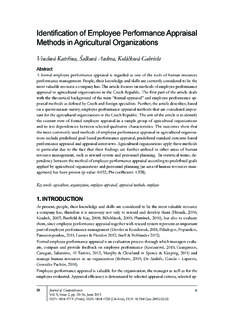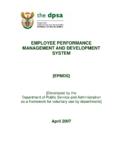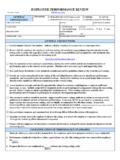Transcription of Career Management, Employee Development and …
1 Business management Dynamics , , Nov 2011, Society for Business and management Dynamics Career management , Employee Development and Performance in Indian Information Technology Organizations Dr. Harold Andrew Patrick1, Amit Kumar2 Abstract Employee Development has surged to the forefront on concerns for HR departments. Many organizations have established Career centers to enhance employees professional growth. Employee Development is sponsored by an organization for its workers and focuses on identifying, assuring, and helping evoke new insights through planned learning. A lack of Career planning for promotion and individual aspirations with organizational needs and opportunities causes great personal and financial hardship, both to the individual and the company. The present study investigates relationship between Career planning, performance and Employee growth and explores the alignment between individual and organization s Career planning.
2 100 employees from five Indian IT companies were administered a researcher developed questionnaire followed by personal interviews to collect data. It was found that Career guidance, leadership roles, network building, developing new skills, taking up special assignments and receiving productive feedback from the boss play the most important role in making the careen path easier and also aids in the performance and Employee growth. Will to seek information, introspecting past experience, experimenting new work roles, and discussing Career interest with superiors and colleagues play a moderate role in Career planning and performance of the employees. The paper discusses the results and implications for Indian IT organizations. Key words: Employee Development , Career planning, Employee growth, Employee performance, IT organization Available online ISSN: 2047-7031 INTRODUCTION The business world is undergoing unprecedented change.
3 Organisations operating in this complex business environment are constantly engaged in restructuring and downsizing processes, facilitating mergers and acquisitions and embracing technological advancements to cope with the dynamic pressures of globalisation. These changes at the organisational level have elevated the importance of managing people at work, and in particular, the planning and managing of their careers. Arguably, people are the most valuable resource in contemporary organisations, and providing them with a long term stable Career is a win-win situation for both organisations and their employees. However, during the last few decades the notion that individuals are also responsible to cater to and build their own careers, instead of leaving it entirely to the organisation to manage, has been well documented. Hence, Career management requires initiative from both organisations as well as individuals in order to provide maximum benefit for both.
4 It is the goal of all quality organizations to provide their employees superior opportunities to grow, both individually and as professionals. Nothing has greater impact than hiring the right people and having them develop simultaneously with the company s own growth. This creates continuity of management and knowledge and also an environment for employees to thrive and grow. It has been frequently shown that appreciation and growth can be stronger motivators for an Employee than money and can result in reduced turnover rate, improved customer service and ultimately generates higher profits for the company. With this in mind, it is best to lay out clear expectations for performance so that employees can achieve both personal and professional growth. Employees should understand that their employer is committed to making every effort to educate them so that they can expand their horizons and take on new responsibilities over time and being employable.
5 1 Head OB and HRM, Coordinator ( management ) Program, Institute of management , Christ University, Hosur Road, Bangalore 560029, 9902954910(Mob), 40129523 (Off) 2 Senior Executive Talent Acquisition Wipro Infotech, WIPRO LTD. # 5, Pappana Street, St. Marks Road, Bangalore 560001, 9241859875 (Mob) Business management Dynamics , , Nov 2011, Society for Business and management Dynamics Career management is the process by which individuals collect information about values, interests, and skill strengths and weaknesses ( Career exploration), identify a Career goal, and engage in Career strategies that increase the probability that Career goals will be achieved. The Career management process involves Career exploration, Development of Career goals, and use of Career strategies to obtain Career goals. The relationship between different aspects of the Career management process and Employee Development behaviour and performance was examined in this study.
6 Employees provided information concerning their personal characteristics, Career management strategies, their manager's support for Career Development , and willingness to participate in Development activities. According to McDaniels and Gysbers (1992), Career Development is the total constellation of psychological, sociological, educational, physical, economic, and chance factors that combine to shape the Career of any given individual over the life span. Greenhaus, Callanan and Godshalk (2000) suggests that Career Development is an ongoing process by which individuals progress through a series of stages, each of which is characterised by a relatively unique set of issues, themes, and tasks. Hall and Associates (1986) define Career Development as the outcomes emanating from the interaction of individual Career planning and institutional Career management processes.
7 Career Development as an HR intervention program is not about promoting linear Career progression upwards through a layered hierarchy of increasing responsibilities, financial rewards and more time spent at work. It is about helping employees to become change resilient, more secure in them and their future as the organisation adjusts to changing market situations. It is about increasing employability that broadens the range of potential job roles open to the individual and extends the value of their staying with this employer. LITERATURE REVIEW The review of literature focuses on the use of Career management and Development systems for improving employees' Career motivation and commitment because of the purported link between Career management , performance, developmental behaviour, and participation in Development activities. No empirical research has investigated the relationship between the Career management process, developmental behaviour, and job performance.
8 Developmental behaviour and activities ( attending courses, reading journals, or initiating new projects) are designed to enhance personal and professional growth (London, 1989). Previous studies of Career management have focused on only one aspect of the Career management process, such as exploration behaviour or Career goal setting ( Stumpf, Colarelli and Hartman, 1983). In this study, the influence of multiple aspects of Career management is simultaneously investigated. Most other studies of Career management have used student samples. The large majority of studies of Career management have used outcome measures related to personal effectiveness such as satisfaction with occupational choice and Career information (Greenhaus and Sklarew, 1981; Stumpf et al., 1983). Naturally, with proper Career planning and Career management , an individual expects to reap the result of such investment by attaining Career Development .
9 This notion of Career planning and Development initiatives fostering organisational effectiveness depends on the organisation s ability to transit employees from a traditional pattern of expectation to one of increased responsibility for their own Career growth and Development (Martin, Romero, Valle & Dolan 2001). A well designed Career Development system enables organisations to tap their wealth of in house talent for staffing and promotion by matching the skills, experience, and aspirations of individuals to the needs of the organisations. In addition, it enables them to make informed decisions around compensation and succession planning to attract, retain and motivate the employees, resulting in a more engaged and productive workforce (Thite 2001, Kapel & Shepherd 2004, Kaye 2005). Career Development must be an ongoing system linked with the organisation s human resource (HR) structures and not a onetime event (Leibowitz, et ).
10 This paper attempts to explore on variables that link Career management and Employee Development to performance in Indian IT organizations. OBJECTIVES OF THE STUDY 1. To find out the Employee s perceptions about Career management and Employee Development dimensions 2. To measure the extent of Career exploration by employees 3. To identify the Career goal characteristics of employees Business management Dynamics , , Nov 2011, Society for Business and management Dynamics 4. To measure the extent of Career strategies of the employees 5. To find the manager's support for the Development of the employees 6. To measure the willingness of the employees to participate in Development activities 7. To find the extent to which the employees are engaged in developmental behaviour SAMPLE SIZE AND TECHNIQUE ADOPTED 100 employees from 5 top Indian IT Companies were the sample population. The technique used was simple random sampling.

